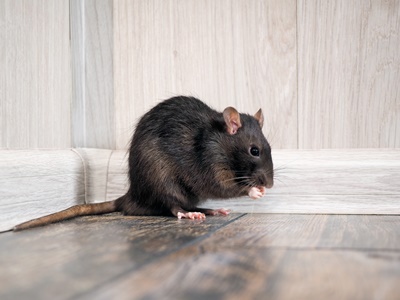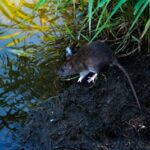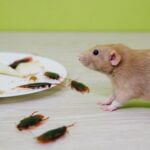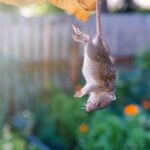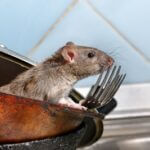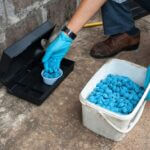Rats are omnivorous rodents, so they consume both plant and animal matter.
Rats scavenge for pieces of meat, but if nothing more suitable can be found, they may eat one another. If they’re sufficiently hungry, they may unwittingly feed on the poisoned carcasses of other rats.
If a rat is dead, live rats will eat it. This allows the living rats to remove the decaying body, which could attract predators. If rats are starving, a dead rat is an easy meal.
If there are food shortages, rats will fight and kill each other. Then, the carcass will be eaten. Rats are rarely predatory, but cannibalistic tendencies can manifest under certain conditions.
Mother rats (dams) are prone to eating their young when sick or when they require nutrients. Father rats (bucks) can kill and eat baby rats to encourage the mother to breed.
Do Rats Eat Each Other When Dead?
Rats will eat the carcasses of other rats if no other food sources are available. They can also cannibalize their dead as a deterrent against predators.
Dangerous animals would otherwise be lured to the nest by the smell of the rotting body. So, rats must eat their dead for their colony’s survival.
It’s uncommon for rats to kill each other intentionally, but this can occur in populations with dwindling food reserves. Here, rats become more aggressive and fight over the available food.
Then, the surviving colony members will eat rats that die during these fights.
Is It Normal For Rats To Eat Their Dead?
Rats will cannibalize their dead colony mates even if there’s abundant food nearby.
As mentioned, this process deters predators from coming to investigate. Rats are also opportunistic feeders, opting for the easiest, closest, and safest food.
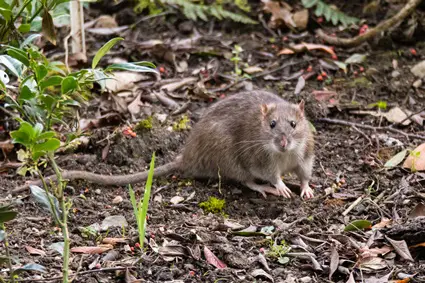
Do Rats Eat Poisoned Dead Rats?
Rats sometimes eat poisoned, dead rats.
They’re intelligent creatures known to avoid toxic substances. If a rat senses that a toxin or disease has led to the other rat’s death, it’ll likely avoid the carcass.
However, rats may fail to notice this or be unable to detect it. Also, if starving, it may feed on the carcass anyway. With nothing else to eat, rats will focus on an easy meal, not the dangers. That’s because rats rarely survive for more than four days without food.
According to Carbohydrate Research, rats can develop poison shyness. Rats are clever enough to realize that eating a particular food and becoming ill usually means the food is bad.
They may not recognize that it was intentionally poisoned, but they’ll learn to avoid food like it. Rats exposed to bait may refuse to eat other non-toxic foods to stay safe.
That’s why most rat poisons focus on causing nervous system damage and internal bleeding, as the symptoms aren’t immediately connected to tarnished food.
It’s unclear if rats apply this knowledge to other dead, poisoned rats. However, it stands to reason that some rats avoid their poisoned brethren, and others eat them only when sustenance is limited.
Can Rats Die From Eating Poisoned Dead Rats?
Despite their resilience, rats can succumb to secondary poisoning. If a rat eats the carcass of a poisoned rat, this toxin will transfer to it.
It usually takes 2-3 days for a rat to die from poisoning. You may hear the poisoned rat screaming in confusion during this time as the poison slowly spreads throughout its body.
Often, the dying rat will come out of hiding in search of water because it is severely dehydrated. In other cases, the rat may retreat to its nest to die.
You may hope that poisoning one rat will lead to secondary poisoning in other cannibalistic rats. However, this isn’t guaranteed to happen.
It’s more likely to happen if you choose a bait that attacks the nervous or circulatory systems. This leads to symptoms that don’t appear connected to ingestion and fail to produce a detectable odor.
Are Rats Cannibals?
Rats don’t usually hunt other members of their species. However, they’re willing to cannibalize other rats in certain circumstances.
Rats eat other rats when they’re:
- Dead.
- Dying.
- Young.
- Severely injured.
- Smaller than them.
Domestic rats are more likely to eat their dead to keep away predators.
According to the Journal of the Royal Society of Medicine, a severe shortage of food and water can trigger rats to hunt and eat other members of their species.
Young rats are more likely to be killed and eaten by adult rats.
Why Do Rats Eat Their Young?
According to one Developmental Psychobiology, female rats will often eat their sickly pups if they have more babies than they can care for. This gives the healthy pups a better chance of survival.
Also, eating their pups provides female rats with the nutrition they need to get pregnant again. Adult males eat newly-born rats to bring females back in heat and motivate them to breed.
Mother rats sometimes kill and eat their babies due to stress. They would sooner cull the litter and start again than put themselves in danger.
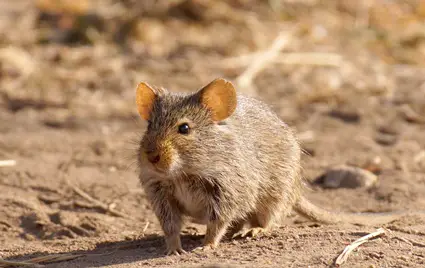
Do Rats Hunt Other Rats?
Only in extreme cases of starvation do rats eat other rats.
However, male rats will often fight each other to assert dominance. In colonies where food is scarce, the dominant male rats may expel the weaker males to prevent them from eating valuable food supplies.
Do Wild Rats Know When Other Rats Die?
Wild rats can quickly detect when another rat has died, even from a distance.
However, rats aren’t the only ones with a strong sense of smell. Rats will flock toward a dead rat to investigate and eat it to avoid the unwelcome attention of predators.
Do Rats Stay Away from Dead Rats?
The smell of a dead rat is more likely to attract other rats rather than repel them. Unlike cockroaches, which take the smell of death as a warning to flee from danger, rats take it as an invitation.
A rotting rodent carcass is an easy meal and a tempting lure to predators. Rats will prioritize cleaning up the body through feeding rather than staying away.
If you find a dead rat in your home, dispose of it immediately.

